lesson 10 Travel Agency Management 旅游管理专业英语PPT课件
Unit 10《旅游英语》配套的课件
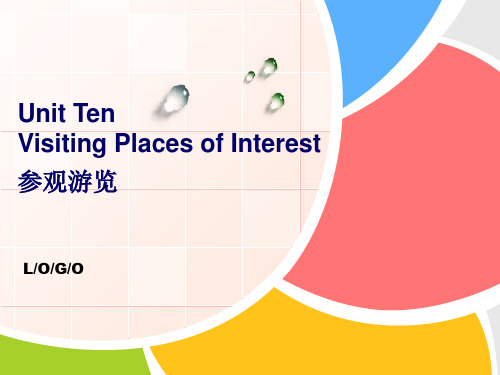
Types of Places of Interest 景点类型
• 1. Ancient relics(古代遗迹): the Ruins of Yin … • 2. Historic architectures: the Great Wall, the Yellow
Crane Tower, the Great Wild Goose • Pagoda … • 3. Museums: the Museum of Emperor
• 2. That will not be fairly complex but you have a long way to go. • 3. That’s not so confused . I have noted. • 4. I will pay special attention to the tunnels. • 5. There will be services provided in English by China Telecom .
• ——master the basic words and expressions about introducing places of interest;
• ——get some cultural knowledge about the places you are visiting;
• ——find ways to improve your writing skills about writing travel routes;
旅行社经营管理实训教材

旅行社经营管理实验教学大纲(Travel Agency Management)(供四年制旅游管理专业2012级试用)课程编号:面向专业:旅游管理实验类别:专业课实验实验时数:8考核方式:考查实验总的目的与要求:通过本课程的实践学习,学生可以更深入的了解旅行社的经营特点、组织结构,掌握旅行社管理的一般规律,能够将所学的理论知识很好的应用到实践中,为将来从事旅行社经营管理相关工作打下坚实的基础。
其中:验证性实验25 %,设计性实验50 %,综合性实验25 %教材及参考书目:[1]赵利民.旅行社经营管理.第二版.北京:中国人民大学出版社,2012[2]李宏,杜江.旅行社经营与管理.第二版.天津:南开大学出版社,2011[3]苏英,陈书星.旅行社经营与管理.第一版.北京:化学工业出版社,2011[4]朱晔.旅行社经营与管理实务.第一版.陕西:西安交通大学出版社,2010[5]刘爱月.旅行社经营与管理.第一版.北京:对外经济贸易大学出版社,2010[6]陈永发.旅行社经营管理.第二版.北京:高等教育出版社,2008[7]杜江.旅行社经营与管理.第一版.天津:南开大学出版社,2001执笔人:范晓庆审核人:龚艳教学院长:刘曙霞《旅行社经营管理》课程实训指导书龚艳编写目录实训一旅行社设立实训二旅游产品开发实训三旅行社营销实训四旅行社接待实训一旅行社设立实训时数:2课时实训目的:1、掌握目前我国旅行社的主要分类情况和各自的业务范围;能够对两者的主要产品和业务体系做对比分析。
2、通过调查问卷,了解你的家乡所在地或者学校所在地的当地居民以及来此地的旅游者对旅行社的职能和作用有所认识?他们对旅行社的社会评价如何?还存在哪些主要的问题和需要改进的方面?3、了解旅行社选址的原则和程序,掌握旅行社选址的方法。
4、了解旅行社申办所需填写的表格,掌握这些表格的基本填写方法。
5、掌握旅行社申办的程序。
实训内容与形式:1、针对旅行社设计调查表格根据项目要求,设计一份有关旅行社基本情况的访谈提纲。
段开成 旅游管理英语lesson 10
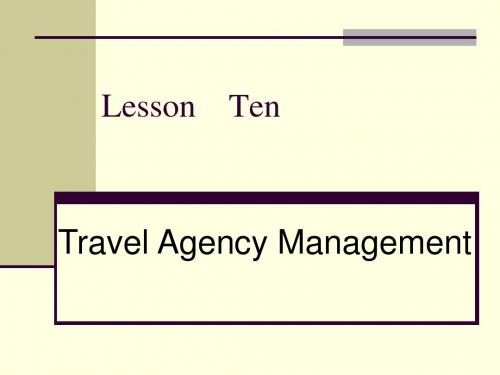
thus is very intense and may be expected to increase in the future. Although more agencies exist today, the number of bankruptcies has also reached record highs in recent years.
Travel agent usually does not own the
services he or she sells to travelers. The agent is paid a commission by suppliers for sales of airline tickets, hotel rooms, and so on.
Lesson Ten
Travel Agency Management
Travel Agency and Suppliers Liabilities of Travel Agency Conferences and Associations
Commissions and Overrides
It is important for them to review carefully all
of the advertising and promotional materials they give to clients to make certain the wording in such material does not negate their disclaimers.
Wholesalers commonly offer a graduated
rate schedule for overrides. This means that the percentage override offered to a travel agent increases as the number of bookings produced by the agent increases. Suppliers also offer other forms of incentives to travel agents to entice them to sell their services.
旅游社计调管理实训教材
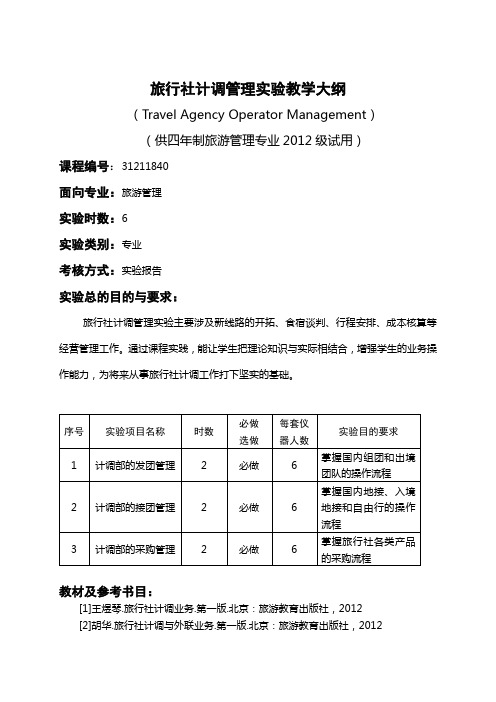
旅行社计调管理实验教学大纲(Travel Agency Operator Management)(供四年制旅游管理专业2012级试用)课程编号:31211840面向专业:旅游管理实验时数:6实验类别:专业考核方式:实验报告实验总的目的与要求:旅行社计调管理实验主要涉及新线路的开拓、食宿谈判、行程安排、成本核算等经营管理工作。
通过课程实践,能让学生把理论知识与实际相结合,增强学生的业务操作能力,为将来从事旅行社计调工作打下坚实的基础。
教材及参考书目:[1]王煜琴.旅行社计调业务.第一版.北京:旅游教育出版社,2012[2]胡华.旅行社计调与外联业务.第一版.北京:旅游教育出版社,2012[3]米学俭,尚永利.旅游计调师操作标准教程.第二版.北京:旅游教育出版社,2012[4]蔡海燕.旅行社计调实务.第一版.上海:复旦大学出版社,2011[5]郭春慧.旅行社计调实务.第一版.上海:复旦大学出版社,2010[6]周晓梅.计调部实操手册.第一版.北京:旅游教育出版社,2007[7]熊晓敏.旅行社OP计调手册.第一版.北京:中国旅游出版社,2007 执笔人:范晓庆审核人:刘曙霞专业负责人:龚艳《旅游社计调管理》课程实训指导书蒯小群编写目录实验一计调部的发团管理实验二计调部的接团管理实验三计调部的采购管理实训一计调部的发团管理实训时数:2课时实训目的和要求:掌握国内组团和出境团队的操作流程了解旅游资源的概念与特征、旅游资源形成的条件。
实训内容:通过对国内国际多条精品线路产品案例的分析,使学生了解国内组团和国际组团计调业务的操作流程,做到:(1)国内组团旅游线路产品示范;(2)国际组团旅游线路产品示范;实训步骤:教师介绍经典旅游案例资料及视频资料;学生分组讨论与分析;学生汇报演示练习结果;教师集中讲解和总结。
案例一:去年10月15日,张先生夫妇与天津某旅行社签订了赴香港、泰国、新加坡、马来西亚14日游的旅游合同,共支付旅游费用11340元,并定于去年10月25日发团。
travelagency关于旅行社的英文词汇、对话、短语travelagency

travel agency 关于旅行社的英文词汇、对话、短语travel agency导读:就爱阅读网友为您分享以下“关于旅行社的英文词汇、对话、短语travel agency”的资讯,希望对您有所帮助,感谢您对的支持!Travel AgencyDecember 7th 2011I.General IntroductionA travel agency is a retail business that sells travel relatedproducts and services to customers on behalf of suppliers,such as airlines, car rentals, cruise lines, hotels, railways, sightseeing tours and package holidays that combine several products.OriginsThe British company Cox & Kings is sometimes said to be the oldest travel agency in the world, but this rests upon the services that the original bank, established in 1758, supplied to its wealthy clients. The modern travel agency first appeared in the second half of the 19th century. Thomas Cook, in addition to developing the package tour, established a chain of agencies in the last quarter of the 19th century, in association with the Midland Railway. They not only sold their own tours to the public, but in addition, represented other tour companies. Other British pioneer travel agencies were Dean & Dawson,[1] the Polytechnic T ouring Association and the Co-operative Wholesale Society. The oldest travel agency in North America is Brownell Travel; on July 4, 1887, Walter T. Brownell led ten travelers on a European tour, setting sail from New York on the SSDevonia.[2]Travel agencies became more commonplace with the developmentof commercial aviation, starting in the 1920s. Originally, travel agencies largely catered to middle and upper class customers, but the post-war boom in mass-market package holidays resulted in travel agencies on the main streets of most British towns, catering to a working-class clientele, looking for a convenient way to book overseas beach holidays.OperationsAs the name implies, a travel agency's main function is to act as an agent, that is to say, selling travel products and services on behalf of a supplier. Consequently, unlike other retail businesses, they do not keep a stock in hand. A package holiday or a ticket is not purchased from a supplier unless a customer requests that purchase. The holiday or ticket is supplied to them at a discount. The profit istherefore the difference between the advertised price which the customer pays and the discounted price at which it is supplied to the agent. This is known as the commission. In Australia, all individuals or companies that sell tickets are required to be licensed as a travel agent.[3]In some countries, airlines have stopped giving commission to travel agencies. Therefore, travel agencies are now forced to charge a percentage premium or a standard flat fee, per sale. However,some companies still give them a set percentage for selling their product. Major tour companies can afford to do this, because if they were to sell a thousand trips at a cheaper rate, they still come out better than if they sell a hundred trips at a higher rate. This process benefits both parties.Other commercial operations are undertaken, especially by the larger chains. These can include the sale of in-house insurance, travel guide books and timetables, car rentals, and the services of an on-site Bureau de change, dealing in the most popular holiday currencies.The majority of travel agents have felt the need to protect themselves and their clients against the possibilities of commercial failure, either their own or a supplier's. They will advertise the fact that they are surety bonded, meaning in the case of a failure, the customers are guaranteed either an equivalent holiday to that which they have lost or if they prefer, a refund. Many British and American agencies and tour operators are bonded with the International Air Transport Association (IATA),[4] for those who issue air tickets, Air Travel Organisers' Licensing (ATOL) for those who order tickets in, the Association of British Travel Agents (ABT A) or the American Society of Travel Agents (ASTA), for those who sell package holidays on behalf of a tour company.A travel agent is supposed to offer impartial travel advice to the customer. However, this function almost disappeared with the mass-market package holiday and some agency chains seemed to develop a 'holiday supermarket' concept, in which customers choose their holiday from brochures on racks and then book it from a counter. Again, a variety of social and economic changes have now contrivedto bring this aspect to the fore once more, particularly with the advent of multiple, no-frills, low-cost airlines. CommissionsMost travel agencies operate on a commission-basis, meaning that the compensation from the airlines, car rentals, cruise lines, hotels, railways, sightseeing tours, tour operators, etc., is expected in the form of a commission from their bookings. Most often, the commission consists of a set percentage of the sale.In the United States, most airlines pay no commission at all to travel agencies. In this case, an agency usually adds a service fee to the net price. Reduced commissions have taken place since 1995, when first commission reductions hit North America: a cap of US$50 on return trips and US$25 on one way. [5] In 1999 European airlines begin eliminating or reducing commissions, while Singapore Airlines goes to zero in parts of Asia.[6] In 2002 Delta Airlinesannounces a zero commission base for USA and Canada; after few months United Airlines, American Airlines,Continental Airlines, Northwest Airlines, US Airways and American Trans Air join Delta Airlines in zero commission base.[7]Types of agenciesThere are three different types of agencies in the UK: multiples, miniples and independent agencies. The former comprises a number of national chains, often owned by international conglomerates, like Thomson Holidays, now a subsidiary of TUI AG, the German multinational.[8] It is now quite common for the large mass-market tour companies to purchase a controlling interest in a chain of travel agencies, in order to control the distribution of their product. (This is an example of vertical integration.) The smaller chains are often based in particular regions or districts.In the United States, there are four different types of agencies: mega, regional, consortium and independent agencies. American Express and the American Automobile Association (AAA) are examples of mega travel agencies.Independent agencies usually cater to a special or niche market, such as the needs of residents in an upmarket commuter town or suburb or a particular group interested in a similar activity, such assporting events, like football, golf or tennis.There are two approaches of travel agencies. One is the traditional, multi-destination, out-bound travel agency, based in the originating location of the traveler and the other is the destination focused, in-bound travel agency, that is based in the destination and delivers an expertise on that location. At present, the former is usually a larger operator like Thomas Cook, while the latter is often a smaller, independent operator.ConsolidatorsAirline consolidators and other types of travel consolidators and wholesalers are high volume sales companies that specialize in selling to niche markets. They may or may notoffer various types of services, at a single point of access. These can be hotel reservations, flights or car-rentals. Sometimes the services are combined into vacation packages, that include transfers to the location and lodging. These companies do not usually sell directly to the public, but act as wholesalers to retail travel agencies. Commonly, the sole purpose of consolidators is to sell to ethnic niches in the travel industry. Usually no consolidator offers everything; they may only have contracted rates to specific destinations. T oday, there are no domestic consolidators, with some exceptions for business class。
英语第一册Unit10-Travel around the word
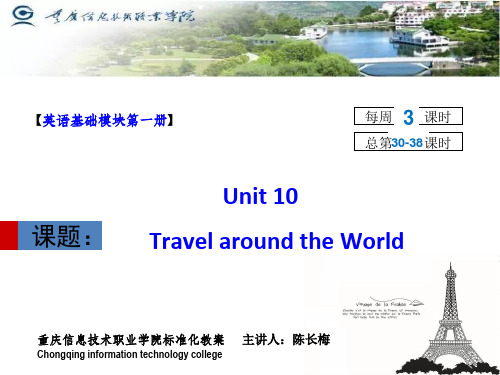
The Potala Palace in Lhasa 拉萨布达拉宫
The Ancient Town of Lijiang 丽江古镇
The Summer Palace in Beijing
the Yellow River(黄河)
China
The Three Gorges of the Changjiang River 长江三峡 -----China
【英语基础模块第一册】
每周
3
课时
总第30-38 课时
Unit 10 课题: Travel around the World
重庆信息技术职业学院标准化教案
Chongqing information technology college
主讲人:陈长梅
Travel around the World
Warming-up Pronunciation Practice Listening and Speaking Language Bank Reading and Writing Grammar Culture and Entertainment Self-test
A I live in a hotel______ a swimming pool. A,with B, to C, from D, of
The Bund
The Bund is where old Shanghai meets new Shanghai. If you walk along the Bund, you will see many old buildings. The Pudong New Area, just across the Huangpu River, has many modern buildings. At night, these tall buildings light up the sky in every direction.
《旅游管理》(英)教学大纲
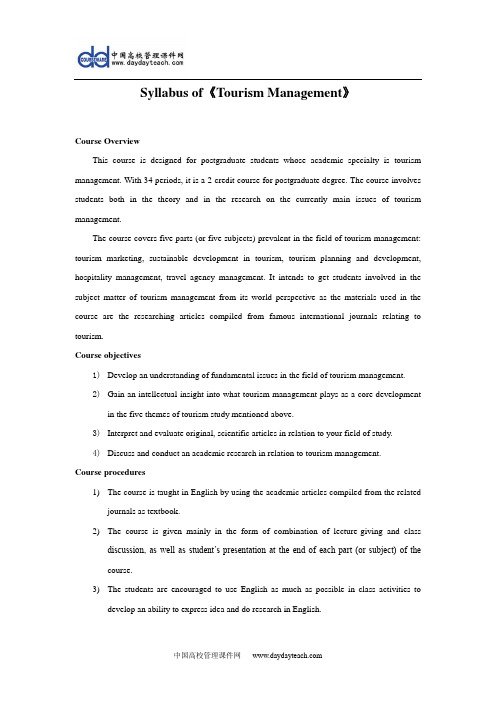
Syllabus of《Tourism Management》Course OverviewThis course is designed for postgraduate students whose academic specialty is tourism management. With 34 periods, it is a 2-credit course for postgraduate degree. The course involves students both in the theory and in the research on the currently main issues of tourism management.The course covers five parts (or five subjects) prevalent in the field of tourism management: tourism marketing, sustainable development in tourism, tourism planning and development, hospitality management, travel agency management. It intends to get students involved in the subject matter of tourism management from its world perspective as the materials used in the course are the researching articles compiled from famous international journals relating to tourism.Course objectives1)Develop an understanding of fundamental issues in the field of tourism management.2)Gain an intellectual insight into what tourism management plays as a core developmentin the five themes of tourism study mentioned above.3)Interpret and evaluate original, scientific articles in relation to your field of study.4)Discuss and conduct an academic research in relation to tourism management.Course procedures1)The course is taught in English by using the academic articles compiled from the relatedjournals as textbook.2)The course is given mainly in the form of combination of lecture-giving and classdiscussion, as well as student’s presentation at the end of each part (or subject) of the course.3)The students are encouraged to use English as much as possible in class activities todevelop an ability to express idea and do research in English.Course contentsPart 1. Tourism marketingCase one: Cultural tourism in central and eastern Europe: the views of ‘induce d image formation agents’1.1Cultural tourism and its rationale1.2Importance of cultural tourism1.3Markets and promotion1.4Culture and commercializationCase two: Tourism marketing images of industrial cities1.5Geographical study1.6Critical sociology1.7Marketing images of industrial citiesPart 2. Sustainable development in TourismCase one: Creating and implementing a model for sustainable development in tourism Enterprises 2.1 Collaboration and integrated tourism planning2.2 Critical factors of collaboration within tourism2.3 Experiences from tourism enterprisesCase two: Challenges of sustainable tourism development in the developing world: the case of Turkey2.4 Sustainable development2.5 Sustainable tourism development2.6 Emergence of environmental mattersPart 3. Tourism planning and developmentCase one: Developing countries and tourism ecolabels3.1 the tourism ecolabeling process3.2 Ecolabeling schemes for the tourism industry3.3 Practicability issues relating to tourism ecolabeling in developing countriesCase two: Operationalizing sustainability in regional tourism planning: an application of the limits of acceptable change framework3.4 Limits of acceptable change planning process3.5 development of survey instrument3.6 desirable types of tourism developmentPart 4. Hospitality managementCase one: Measuring the impact of human resource management practices on hospitality firms’ performance4.1 Measures of organizational performance influenced by HRM4.2 HRM practicesCase two: Employment, flexibility and labor market practices of domestic and MNC chain luxury hotels in Australia: where has accountability gone?4.3 Demographic characteristic4.4 Job status and tenure4.5 Remuneration4.6 Labor market development and HR innovationPart 5. Travel agency managementCase one: Emerging e-commerce development model for Taiwanese travel agencies5.1 E-commerce development strategy5.2 E-commerce development model5.3 confirmative factor analysis and correlation analysisCase two: Service quality of travel agents: the case of travel agents in Hong Kong5.4 The SERQUAL service5.5 Dimensions of service quality5.6 The five dimensions: customer expectation and perception alongStudent evaluation & grading criteriaYou are evaluated in two areas, which totals 100 grading points:1)class discussion and presentation=30%: It is based on your active class discussion andsubject-related presentation.2)Research paper=70%:It is a small paper in English with around 2,000 words, forwhich you may choose any one of the topic of interest in relation to the subjects of the course or to the subjects of your supplementary reading material used in your presentation before.Text book and reference bookText bookTourism Management compiled by Su BaorenReference book:Tourism Management Towards the New Millennium, by Chris Ryan and Stephen Page; Publisher: Pergamon; Publish date: 2000; Binding: hardback。
关于旅行社的英文词汇、对话、短语travel-agency
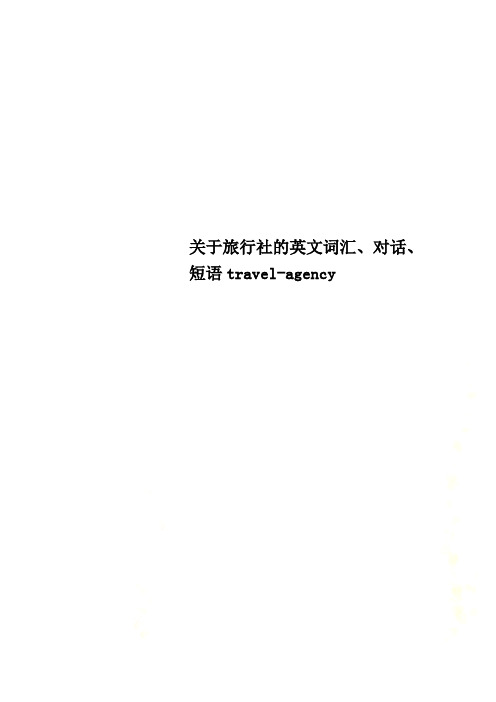
关于旅行社的英文词汇、对话、短语travel-agency1 Words about travel agencyChina's category Atravel agency 一类社China's category B travel agency 二类社China's category C travel agency 三类社China International Travel Service, Head Office中国国际旅行社,总社China National Tourism Administration 中国国家旅游局. China Travel Service中国旅行社. China Youth Travel Service 中国青年旅行社World Tourism Day 世界旅游日World Tourism Organization 世界旅游组织Tourist Administration 旅游局China's National Tourism Administration 中国旅游局Provincial Tourism Administration ……省旅游局Autonomous Region Tourism Administration 自治区旅游局Municipal Tourism Administration 市旅游局Autonomous Perfecture Tourism Administration 自治州旅游局County Tourism Administration 县旅游局national tourist organization 全国旅游组织local tourist organization 地方旅游组织Clothes,bearing and appearance 服装仪表guidebook 旅游指南guild practice 导游实践international tourism 国际导游itinerary 旅行计划,节目local guide 地陪,地方导游low season 淡季minimum tour price 最低旅游价格multilingual guide 会多种语言的导游national guide 全陪,全程导游off-peak season 淡季off season 淡季on season 旺季peak season 旺季professional (staff)旅游专业人员programme 节目receiving country 旅游接待国regional tourist organization 区域旅游组织season-high 旺季season-low 淡季selling season 旺季shoulder period/season 平季sightseeing 游览slack season 淡季state-list famous historical and culture cities 国家级历史文化名城tour arrangement 旅游安排tour brochure 旅游小册子tour catalog 旅游团目录tour code number 旅游代号编码tour escort/conductor/director 旅游团陪同tour leader 领队,团长tour operation 旅游业务tour route 旅游路线tour talker 自动导游磁带机tourism 旅游业,旅游tourism activities 旅游活动tourism circles 旅游界touring 游览touring club 旅游俱乐部tourist 游客tourist association 旅游协会tourist authority/office 旅游局tourist council 旅游委员会tourist destination 旅游目的地tourist destination area 旅游目的地地区tourist destination country 旅游目的国tourist map 旅游地图tourist organization 旅游组织tourist periodical 旅游周刊tourist spots 旅游点tourist trade 旅游界travel 旅行travel business 旅游业务travel expert 旅游专家travel industry 旅游业travel journalist 旅游记者travel press 旅游报纸travel publication 旅游出版物travelling 旅游travelling expense 旅费travel-see tourism 旅游(美)travel trade 旅游业travel writer 旅游作家trip 旅行tourism 旅游package tour, inclusive tour 包办旅行outward journey 单程旅行return journey, round trip 往返旅行holiday 假期excursion, outing 远足expedition 远征,探险hitchhiking, hitching 搭乘itinerary 旅行指南itinerary, route 旅行路线stopover 中途下车暂停stage 停歇点,中间站departure at 10 a.m. 上午10时出发arrival at 12 p.m. 夜12点抵达stay 停留return 返回embarkation, embarcation 乘船,上船disembarkation 下船delay 延期travel agency 旅行社airline company 航空公司traveller's cheque 旅行支票ticket 票single ticket 单程票return ticket 往返票,双程票(美作:round-trip ticket)fare 票价half (fare), half-price ticket 半票passage 票,票价passengers 旅客passport 护照visa 签证papers 证件identity card 身份证customs 海关safe-conduct, pass 安全通行证excursionist, tripper, hiker 旅行者tourist 旅游者traveller 旅行者,旅游者(美作:traveler)commercial traveller 旅行推销员(美作:traveling salesman) commercial traveller (美作:traveling salesman)旅行推销员tourist旅游者itinerary 旅行指南route旅行路线pleasure trip 游览business trip 商务旅行outbound tourism;outbound travel 出境游outbound tourist 出境游客backpacker 背包旅行者free walker 自由行circular tour 环程旅行return journey;round trip 往返旅行outward journey单程旅行package tour;inclusive tour 套餐游;包办游excursion;outing远足expedition 探险traveller’s cheque 旅行支票independent traveler 旅游散客tour group 旅游团holiday resort 度假区outbound tourist出境游客outward journey单程旅行single ticket单程票sightseeing tour观光旅游seaside resort海滨胜地circular tour环程旅行healing resort疗养胜地traveller’s cheque旅行支票designated tourist restaurant旅游定点餐馆service grade in tourism旅游服务等级standards of service quality in tourism旅游服务质量标准tourist administration bureau旅游管理局tourist attraction旅游热点independent traveler旅游散客tourist complaint旅游投诉tour group 旅游团meals for tour group旅游团队餐package tour全由旅行社安排的旅行commercial tour商务旅行group / party tour团体旅游return journey / round trip往返旅行star-rated hotel星级饭店conducted / guided tour有向导的旅行2出行火车railway, railroad 铁路track 轨道train 火车locomotive 火车头、机车railway system, railway network 铁路系统CRH train 动车组express train 特别快车fast train 快车through train 直达快车stopping train, slow train 慢车excursion train 游览列车commuter train, suburban train 市郊火车railcar 轨道车coach, carriage 车厢sleeping car, sleeper 卧车dining car, restaurant car, luncheon car 餐车double-decker train 双层火车sleeper with couchettes 双层卧铺车berth, bunk 铺位up train 上行车down train 下行车luggage van, baggage car 行李车mail car 邮政车station, railway station 车站station hall 车站大厅booking office, ticket office 售票处ticket-collector, gateman 收票员ticket inspector 验票员platform 月台、站台platform ticket 站台票terminal 终点站railway policeman 乘警buffet 小卖部waiting room 候车室mother-and-child room 母子候车室VIP room 贵宾候车室valuables 贵重品porter 行李员luggage/baggage 行李registered/checked luggage 托运行李在(某地)换车to change trains at…… 在(某时)到达the train is due at…飞机regular flight 正常航班non-scheduled flight 非正常航班international flight 国际航班domestic flight 国内航班flight number 航班号airport 机场airline operation 航空业务alternate airfield 备用机场landing field 停机坪international terminal 国际航班候机楼domestic terminal 国内航班候机楼control tower 控制台air-bridge 旅客桥visitors terrace 迎送平台jetway 登机道air-bridge 旅客桥visitors terrace 迎送平台concourse 中央大厅loading bridge 候机室至飞机的连接通路airline coach service 汽车服务shuttle bus 机场内来往班车passport 护照visa 签证papers 证件safe-conduct,pass 安全通行证take off 起飞touch down 落地boarding pass 登记牌check in 办理登机手续departure lounge候机室flight number 航班号international arrival国际抵达处domestic arrival国内抵达处terminal 航站楼行李luggage barrow 推行李车personal effects 私人用品group baggage 团体行李claim tag 行李票handbag tag 行李牌label 行李标签luggage office 行李房baggage train 行李搬运车airway bill 航运收据hand luggage 手提行李light luggage 轻便行李baggage elevator 行李电梯baggage receipt 行李收据trolley 手推车storage room 行李仓suit bag 衣服袋travelling bag 旅行袋shoulder bag 背包trunk 大衣箱suitcase 小提箱name tag 标有姓名的标签valuables 贵重品3食宿1旅馆酒店分类inn 旅馆,饭店lodge 小旅馆tavern 酒店caravansary 马车店,大旅馆hostel 招待所hotel 饭店,酒店motel(=motor hotel)汽车饭店(旅店)budget hotel 廉价旅馆B&B 提供一夜住宿和早餐的旅馆youth hostel 青年招待所luxury hotel 豪华饭店residential hotel公寓旅馆boardinghouse 寄宿公寓economy hotel(one-star hotel)一星级饭店some comfort hotel(two-star hotel)二星级饭店average hotel(three -star hotel)三星级饭店high comfort hotel(four -star hotel)四星级饭店deluxe hotel(five-star hotel)五星级饭店2客房种类(1)single room 单人房(一张单人床)double room 双人房(二张单人床)double double 双人房(二张双人床)big single room大床房(一张双人大床)tripe room 三人房(三张单人床)(2)economy room(ER)经济间standard room(SR)标准间superior room(UR)高级套房suit(ss)套间deluxe room(DR)豪华间presidential suit(PS)总统套房(3)studio room 工作室型客房(设沙发床或躺椅)multi-functional room 多功能客房combined type rooms 组合客房3饭店计价方式(1)European plan(EP)欧式计价(只计房租,不包括餐饮等费用)(2)American plan(AP)美式计价(计算房租并包括每日三餐费用在内)(3)modified American plan 修正美式计价(计算房租且包括两餐费/早餐,午餐,晚餐中选两餐)(4)continental plan(CP)欧陆式计价(计算房租且包括欧陆式早餐餐费)(5)Bermuda plan(BP)百慕大计价(计算房租,包括美式早餐餐费)4world famous hotels5 Accommodation 住宿必备词汇platfroom rate 房价stanstowaway reservation 订房间registration 登记rroom rate 房价standard rate 标准价en-suite 套房family suite 家庭套房twin room you 带两张单人床的房间double room 带一张双人床的房间advance deposit 定金ate sheets 房价表tariff 价目表cancellation 取消预定imperial suite 皇室套房presidential suite 总统套房suite deluxe 高级套房junior suite 简单套房mini suite 小型套房honeymoon suite 蜜月套房penthouse suite 楼顶套房unmade room 未清扫房on change 待清扫房information desk 问讯处reception office 接待室hotel register 旅客登记簿registration form 登记表newsstand 售报处postal service 邮局服务处shop 小卖部bar 酒吧间lounge 休息厅roof garden 屋顶花园billiard-room 球房dining-room, dining hall 餐厅men's room 男盥洗室ladies' room 女盥洗室cloak-room 存衣处basement 地下室cellar 地窖broom closet 杂物室room number 房间号码room key 房间钥匙suite 一套房间single room 单人房间double room 双人房间sitting-room, living-room 起居室sofa, settee 长沙发easy chair 安乐椅armchair 扶手椅wicker chair 藤椅folding chair 叠椅swivel chair 转椅rocking chair 摇椅stool 凳子stool 凳子bench 条凳tea table 茶几desk 书桌bookcase 书橱bookshelf 书架wardrobe 衣柜built-in wardrobe, closet 壁橱chest of drawers 五斗橱screen 屏风hat rack 帽架rug 小地毯carpet 大地毯single bed 单人床double bed 双人床twin beds 成对床mattress 褥子quilt 被blanket 毯子sheet 床单bedspread 床罩cotton terry blanket 毛巾被pillow 枕头pillow 枕头pillowcase 枕套mat 席cushion 垫子bathroom 浴室bath tub 浴盆shower bath, shower 淋浴cold and hot water taps 冷热自来水龙头sprinkle-nozzle, (shower) nozzle 喷头dressingtable 梳妆台mirror 镜子washbasin 洗脸盆towel 毛巾toilet, lavatory, washroom 卫生间water closet, W.C. 厕所;抽水马桶toilet roll, toilet paper 卫生纸bath towel 浴巾bathrobe 浴衣towel rail, towel rack 毛巾架sponge 海绵waste-paper basket 废纸篓thermometer 温度计balcony 阳台balcony 阳台sash window 上下开关窗shutters 百叶窗transom, transom window 气窗curtain 窗帘lace curtain 挑花窗帘windowsill 窗台air-conditioned 有空调设备的radiator 暖气片central heating 暖气ashtray 烟灰碟smoking set 烟具electric fan 电扇chandelier, pendant lamp 吊灯fluorescent lamp 日光灯desk lamp 台灯bedside lamp 床头灯floor lamp 落地灯wall lamp 壁灯lampshade 灯罩bulb holder 灯头bulb 灯泡screw-type bulb 罗口灯泡bayonet-type bulb 卡口灯泡frosted bulb 磨砂灯泡opal bulb, opaque bulb 乳白灯泡switch 开关socket 插座plug 插头telephone 电话electric iron 电熨斗peg, hook 衣钩clothes-hanger 衣架door-mat 门前的擦鞋棕垫manager 经理attendant 服务员desk clerk 值班服务员waiter (餐厅)服务员waitress (餐厅)女服务员rent 租金bill 账单4购物1世界十大购物街BAHNHOFSTRASSE班霍夫大街(瑞士苏黎士)RODEODRIVE罗迪欧大道(美国加利福尼亚州贝弗利山庄)LAUGA VEGUR洛加维格大街(冰岛雷克雅未克)THEGINZA银座(日本东京)FIFTHA VENUE第五大道(美国纽约)MAGNIFICENTMILE宏伟大道(美国伊利诺伊州芝加哥)A VENUEMONTAIGNE蒙田大道(法国巴黎)A VINGUDADIAGONAL对角线大道(西班牙巴塞罗那)VIA MONTENAPOLEONE,VIADELLA SPIGA,蒙提拿破仑街、史皮卡大道和维多利亚二世拱廊(意大利米兰)BONDSTREET庞德街(英格兰伦敦)2l旅游购物需知词汇to do some shopping; to go shopping 买东西shopping centre 商业中心区department store 百货商店children's goods store 儿童用品商店antique shop 古玩店second-hand store 旧货店counter 柜台stall, stand 售货摊show window 橱窗show case 玻璃柜台shelf 货架cash desk, cashier's desk 收银处price tag 标价签prices are fixed, fixed prices 有定价discount 打折扣change 零钱to keep the bill 留发票to wrap up 包装free of charge 不收费to deliver 送be al sold out, out of stock 售空shop assistant, salesman 售货员saleswoman 女售货员glassware counter 玻璃器皿部enamel ware 搪瓷器皿haberdashery 男子服饰用品confectionery 糖果糕点cosmetics 化妆用品stationery 文具fabrics 纺织品dry goods 服装ready-made clothes, off-the-peg, ready-to-wear 成衣,现成服装men's wear 男服women's wear 女服underwear 内衣裤sports goods, athletic equipment 体育用品sundries 零星小物toilet articles 盥洗用品towel 毛巾handkerchief 手帕toilet soap 香皂shampoo 洗发香波soap 肥皂laundry soap 洗衣皂soap powder 肥皂粉soap flakes 皂片medicated soap 药皂detergent 洗衣粉cleanser 去污粉tooth paste 牙膏tooth brush 牙刷toilet mirror 梳妆镜hair brush 发刷hair vaseline 发蜡cosmetics 化妆品lipstick 口红, 唇膏face powder 粉compact 粉盒powder puff 粉扑cold cream 香脂vanishing cream 雪花膏perfume, scent 香水perfume spray 香水喷子coat hanger 挂衣架clothes-peg, clothes pin 晒衣夹string bag, net bag 网兜thermos bottle 热水瓶cap, cork 热水瓶瓶盖travellers' water bottle, water flask, canteen 旅行水壶lunch box, canteen 饭盒thread 线needle 针button 钮扣zipper 拉链key-ring 钥匙圈torch, flashlight 手电bulb 灯泡battery 电池lock 锁watch, wrist watch 表, 手表watch band 表带watch chain 表链clock 钟alarm clock 闹钟electric clock 电钟umbrella 雨伞parasol, sun umbrella 阳伞knapsack 背包handbag 女手提包briefcase, portfolio 公事包travelling bag 旅行包suitcase 手提箱trunk 大衣箱magnifying glass 放大镜telescope 望远镜hot-water bottle 热水袋smoking set 烟具lighter 打火机jewelry, jewels 首饰, 珠宝jewel case 首饰盒antique, curio 古玩ornaments 装饰品ring, finger ring 戒指signet ring 印章戒指necklace 项链brooch 胸针pendant 坠子bracelet 镯子chain bracelet 手链ear ring 耳环trinket 小饰物safety-pin 别针cuff-link 袖扣diamond 钻石gold jewelries 金饰silver jewelries 银饰pearl genuine 真的fake 假的baby's cot, crib 婴儿床cradle 摇篮diaper, napkin 尿布feeding bottle, feeder 奶瓶teat, nipple 橡皮奶嘴dummy, comforter 假奶嘴perambulator 儿童车go-cart, walker, babywalker 儿童学步车rocking-horse 摇马scooter 踏板车child's tricycle 儿童三轮车razor 剃刀safety razor 保险剃须刀electric razor 电剃刀razor blade 刀片shaving brush 剃须刷shaving cream 剃须膏comb 梳子hair-brush 发刷hair-net 发网hair pin 发夹hair oil, brilliantine 发油hair lotion 生发水pomade 发膏hair drier 吹风机hair-curler 卷发夹electric clippers, electric shears 电推子nail scissors 指甲剪nail clipper 指甲夹nail file 指甲锉nail varnish, nail polish 指甲油5世界著名景点Asia 亚洲Angkor Wat, Cambodia 柬埔寨吴哥窟Babylon, Iraq 伊拉克巴比伦遗迹Bali, Indonesia 印度尼西亚巴厘岛Borobudur, Indonesia 印度尼西亚波罗浮屠Crocodile Farm, Thailand 泰国北榄鳄鱼湖Forbidden City, Beijing, China 北京故宫Great Wall, China 中国长城The Himalayas 喜马拉雅山Mount Fuji, Japan 日本富士山Pattaya Beach, Thailand 泰国芭堤雅海滩Sentosa, Singapore 新加坡圣淘沙T aj Mahal, India 印度泰姬陵America 美洲Central Park, New York City, USA 美国纽约中央公园Disneyland, California, USA 加利佛尼亚迪斯尼乐园Grand Canyon, Arizona, USA 美国亚利桑那州大峡谷Hollywood, California, USA 美国加利佛尼亚好莱坞Honolulu, Hawaii, USA 美国夏威夷火奴鲁鲁Las Vegas, Nevada, USA 美国内华达拉斯威加斯Metropolitan Museum of Art, New York City, USA 纽约大都会艺术博物馆Miami, Florida, USA 美国佛罗里达迈阿密Niagara Falls, New York State, USA 美国尼亚加拉大瀑布Statue of Liberty, New York City, USA 美国纽约自由女神像Times Square, New York City, USA 美国纽约时代广场Yellowstone National Park, USA 美国黄石国家公园Yosemite National Park, USA 美国尤塞米提国家公园The White House, Washington DC., USA 美国华盛顿白宫World Trade Center, New York City, USA 美国纽约世界贸易中心Acapulco, Mexico 墨西哥阿卡普尔科Bermuda 百慕大Cuzco, Mexico 墨西哥库斯科Panama Canal 巴拿马大运河Africa 非洲Aswan High Dam, Egypt阿斯旺水坝Cape of Good Hope, South Africa 南非好望角Nairobi National Park, Kenya 肯尼亚内罗毕国家公园The Nile, Egypt 埃及尼罗河Pyramids, Egypt 埃及金字塔Sahara Desert 撒哈拉大沙漠Suez Canal, Egypt苏伊士运河Oceania 大洋洲Ayers Rock 艾尔斯巨石Great Barrier Reef 大堡礁Mount Cook 库克山Sydney Opera House, Australia 悉尼歌剧院Europe 欧洲Arch of Triumph, France 法国凯旋门Big Ben in London, England 英国伦敦大笨钟Buckingham Palace, England 白金汉宫Colosseum in Rome, Italy 意大利古罗马圆形剧场Effiel Tower, France 法国艾菲尔铁塔Elysee Palace, France 法国爱丽舍宫Hyde Park, England 英国海德公园Kolner Dom, Koln, Germany 德国科隆大教堂London Tower Bridge, England 伦敦塔桥Louvre, France 法国卢浮宫Leaning Tower of Pisa, Italy 意大利比萨斜塔Mosque of St, Sophia in Istanbul (Constantinople), Turkey 土耳其圣索非亚教堂Notre Dame de Paris, France 法国巴黎圣母院Venice, Italy 意大利威尼斯Parthenon, Greece 希腊巴台农神庙Red Square in Moscow, Russia 莫斯科红场Westminster Abbey, England 威斯敏斯特大教堂中国著名景点秦始皇陵the Mausoleum of Emperor Qinshihuang兵马俑Terracotta Warriors and horses/Terra-cotta Army青铜战车战马bronze chariots and horses与实物一样大小life-size临潼区Lintong District大雁塔Big Wild Goose Pagoda丝绸之路the Silk Road敦煌Dunhuang敦煌莫高窟Mogao Grottoes / Caves, Dunhuang 千佛洞Thousand-Buddha Cave壁画murals / fresco佛经Buddhist Sutra塔里木盆地Tarim Basin土鲁番Turpan华清池Huaqing Hot Springs河西走廊Hexi Corridor昆山市city of Kunshan帕米尔山区Pamir Mountainous Region三峡Three Gorges月牙泉Crescent Spring桂林Guilin阳朔Yangshuo板石街(又名“西洋街”)Slabstone Street, also known as “the Western Street”象鼻山Elephant Trunk Hill独秀峰the peak of unique beauty七星岩the seven star crag叠彩山Piled Silk Hill骆驼山Camel Hill漓江游cruise on the Li River三山晓色three Hill at Dawn青峰倒影Green Peaks Reflected on Water月牙山Crescent Hill千佛岩Cliff of Thousand Buddhas滇池Lake Dianchi黑龙潭Black Dragon Pool珠江夜游Pearl River Night Cruise岷江Minjiang river野生动物园Safari Park中国民俗文化村China Folk Culture Villages佛教四大名山Four famous Buddhist Mountains 五台山Wutai Mountain普陀山Mount Putuo九华山Jiuhua Mountain峨嵋山Mount Emei五岳China’s five great / s acred mountains武当山Wudang Mountain嵩山Songshan Mountain少林寺Shaolin Temple泰山Mount Tai岱庙Dai Temple日光顶Riguan Peak - the Sun Watching Peak 玉皇顶Peak of the Heavenly Emperor黄山Mount Huangshan; Yellow Mountain迎客松Guest-Greeting Pine半山寺Mid-Hill Temple云谷寺Cloudy Valley Temple光明顶Bright Summit天都峰Heavenly Capital Peak莲花峰Lotus Peak奇松strangely-shaped pines怪石grotesque rock formations云海seas of clouds温泉hot springs紫金山天文台Purple Mountain Observatory 南天门The Heavenly Southern Gate午门meridian gate天坛the Temple of Heaven紫禁城the Forbidden City故宫the Imperial Place故宫博物院the Palace Museum护城河Moat回音壁echo wall居庸关Juyongguan pass长寿山the longevity hill九龙壁the nine dragon wall黄龙洞the yellow dragon cave大清真寺great mosque黄帝陵Huang Di Mausoleum十三陵Ming Tombs中山陵Dr. Sun Yat-sen’s Mausoleum成吉思汗陵Mausoleum of Genghis Khan鲁迅故居Luxun’s former residence(重庆)渣滓洞Cinder Cave(重庆)红岩村Red Crag Village(延安) 宝塔山Pagoda Hill东方威尼斯Oriental Venice苏州园林Suzhou gardens狮子林Lion Grove Garden怡园Joyous Garden留园lingering Garden网师园Garden of the Master of Nets耦园(谐音偶,佳偶之意)Garden of Couple’sRetreat西湖West Lake苏堤Su Causeway白堤Bai Causeway断桥Broken Bridge外西湖Outer West Lake九寨沟jiuzhaigou布达拉宫Potala Palace日月潭Lake Sun Moon名胜古迹places of scenic beauty and historical interests / scenic spots and historical sites6常见提示Off 关Office Hours 办公时间On Sale 削价出售On 打开( 放)One Street 单行道Open Here 此处开启Open 营业Parting 停车处Pause 暂停Please Return the Back After Use 用毕放回架上Poison 有毒/毒品Protect Public Propety 爱护公共财物Pub 酒店Pull 拉Push 推Reduced Speed Now 减速行驶Rew. 倒带Road Up. Detour 马路施工,请绕行Safety First 安全第一Save Energy 节约能源Save Food 节约粮食Seat by Number 对号入座Shooting Prohibited 禁止打猎Shut 此路不通SOS 紧急求救信号Split Here 此处撕开Staff Only 本处职工专用Stop 关闭Take Care Not to Leave Things Behind 当心不要丢失东西This Side Up 此面向上Ticket Office(or :Booking Office)售票处Toll Free 免费通行Travel Agency 旅行社U Turn OK 可以U形转弯Vacant (厕所)无人Visitors Please Register 来宾登记Wet Paint 油漆未干Wipe Your Shoes And Boots请擦去鞋上的泥土Women's/Ladies/Ladies'Room女厕所Give Way 快车先行Guard against Damp 防潮Handle with Care 小心轻放Hands Off 请勿用手摸Hands Wanted 招聘In Shade 置于阴凉处Information 问讯处Insert Here 此处插入Introductions 说明Keep Away From Fire 切勿近火Keep Dry 保持干燥Keep in Dark Place 避光保存Keep Right/Left 靠左/右Keep Silence 保持安静Keep Top Side Up 请勿倒立Laundry 洗衣店Lost and Found 失物招领处Luggage Depository 行李存放处Admission Free 免费入场Beware of Pickpocket 谨防扒手Bike Park(ing) 自行车存车处Buses Only 只准公共汽车通过Business Hours 营业时间Cafe 咖啡馆、小餐馆Children and Women First 妇女、儿童优先Closed 下班Commit No Nuisance 禁止小便Complaint Box 意见箱Danger 危险Do Not Pass 禁止超车Dogs Not Allowed 禁止携犬入内EMS (邮政)特快专递Entrance 入口Exit 出口EXP:25032002 失效期:2002年3月25日F.F. 快进Filling Station 加油站For Use Only in Case of Fire 灭火专用Fragile 易碎DialoguesDialogue A(A car pulls up in front of Huatian Hotel and a doorman (A) goes forward to meet the guests B and C, opening the door of the car for them.)A: Good evening, sir and madam. Welcome to our hotel.Mr Bell (B): Thanks. Good evening.A: (Opening the trunk, taking out the baggage and looking at the name on the baggage tags.)I'm the doorman, sir. So you have got altogether four pieces of baggage?B: Er. Maybe five, Margaret (C)?A: Five? Oh, sorry. Let me have a check again.C:Oh, no, Henry. Always poor memory! We've got only four.B: I see.(To the doorman) Sorry, boy. You're right. Four pieces.A: Never mind, sir. The Reception Desk is straight ahead. After you, please.B: Yes, thank you.Dialogue BA: Excuse me. Where can I buy some cigarettes?B: There is a shop on the ground floor. It sells both Chinese and foreign cigarettes.A: Can I also get some souvenirs there?B: Yes, sir. There is a counter selling all kinds of souvenirs.A: By the way, where is the men's room?B: There is one at the end of the corridor.A: Thank you.B: You are welcome.Dialogue CA: Excuse me, where is the restaurant?B: We have Chinese restaurant and a western-style restaurant. Which one do you prefer?A: I'd like to try some Chinese food today.B: The Chinese restaurant is on the second floor.Dialogue D(A: Receptionist B: Guest)B: I want a double room with a bath. How much aa day doyou charge?A: It is a hundred yuan a day including heating fee but excluding service charge.B: It's quite reasonable.A: How long do you intend to stay in this hotel?B: I shall leave in a fortnight (half a month).A: Have you got through with the check-in procedure?B: Oh, yes, I'm going to fill in the form of registration right now. Can I book a single room for my friend before hand as he will arrive in Shanghai tomorrow morning?A: Sure. Here is the form for reservations. Would you mind filling in this form and pay hundred yuan in advance for him.B: All right. This is one hundred yuan to pay for my reservation.A: Thank you. This is a receipt for paying in advance. Please keep it.Dialogue EB: Have you any vacant (spare) room in the hotel?A: Sorry, we have no vacant (spare) room for you. But I canre commend you to the Orient Hotel where you may get as pare room. B: That sounds very good! Can I book the plane ticket (train ticket, ship ticket) here?A: Please go to the CAAC office to book your plane ticket. If you want to book your train ticket or ship ticket, you'd better go to the Shanghai International TravelService.B: Could you tell me how many kinds of rooms do you have?A: There are single rooms, double rooms, suites and deluxe suites in our hotel. Every room is equipped with a bat hand a telephone.B: Oh, I see. Thanks.A: You are welcome.Dialogue F(A: Guest B: Receptionist)A: Good afternoon,my room number is 321. Any mail for me?B: Yes. You have two letters and one telegram, also a message was left by a lady before one hour.A: Let me see who called...? I have to make a phone call.Will you get me the party?Here is the number.B: OK. Wait for moment.... Here is your party.A: Thank you.I'll mail a letter to U.S.A. by airmail. How much do I have to pay for you?B: A letter generally mall to America- Europe- Africa by airmail. First 20 grams is 20 yuan.Each additional 20grams is 15 yuan.A: Oh, I see. Thank you very muchDialogue G电话预定房间Hotel Reservation前台:你好,这里是皇家酒店。
典范与思辨:旅游专业课程思政的表达与实现——以“旅行社管理”为例
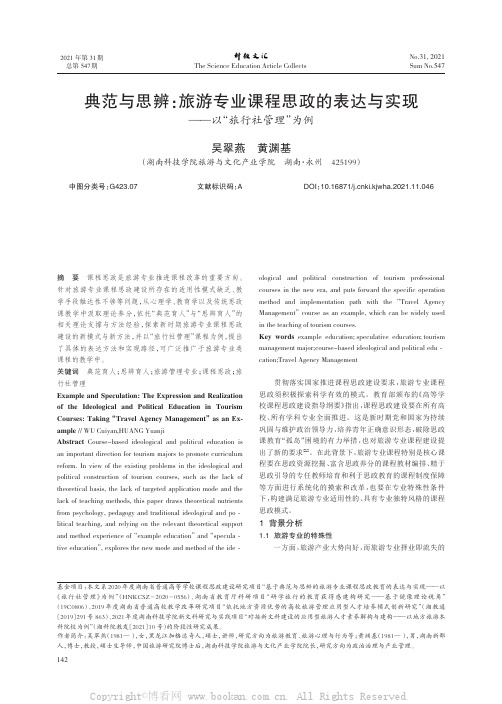
摘要课程思政是旅游专业推进课程改革的重要方向。
针对旅游专业课程思政建设所存在的适用性模式缺乏、教学手段触达性不够等问题,从心理学、教育学以及传统思政课教学中汲取理论养分,依托“典范育人”与“思辨育人”的相关理论支撑与方法经验,探索新时期旅游专业课程思政建设的新模式与新方法,并以“旅行社管理”课程为例,提出了具体的表达方法和实现路径,可广泛推广于旅游专业类课程的教学中。
关键词典范育人;思辨育人;旅游管理专业;课程思政;旅行社管理Example and Speculation:The Expression and Realization of the Ideological and Political Education in Tourism Courses:Taking “Travel Agency Management ”as an Ex⁃ample //WU Cuiyan,HUANG YuanjiAbstract Course-based ideological and political education is an important direction for tourism majors to promote curriculum reform.In view of the existing problems in the ideological and political construction of tourism courses,such as the lack of theoretical basis,the lack of targeted application mode and the lack of teaching methods,this paper draws theoretical nutrients from psychology,pedagogy and traditional ideological and po‐litical teaching,and relying on the relevant theoretical support and method experience of “example education”and “specula‐tive education”,explores the new mode and method of the ide‐ological and political construction of tourism professional courses in the new era,and puts forward the specific operation method and implementation path with the “Travel Agency Management”course as an example,which can be widely used in the teaching of tourism courses.Key words example education;speculative education;tourism management major;course-based ideological and political edu‐cation;Travel Agency Management贯彻落实国家推进课程思政建设要求,旅游专业课程思政须积极探索科学有效的模式。
《旅游管理专业英语》(第二版) 讲义 Lesson10 Tourism
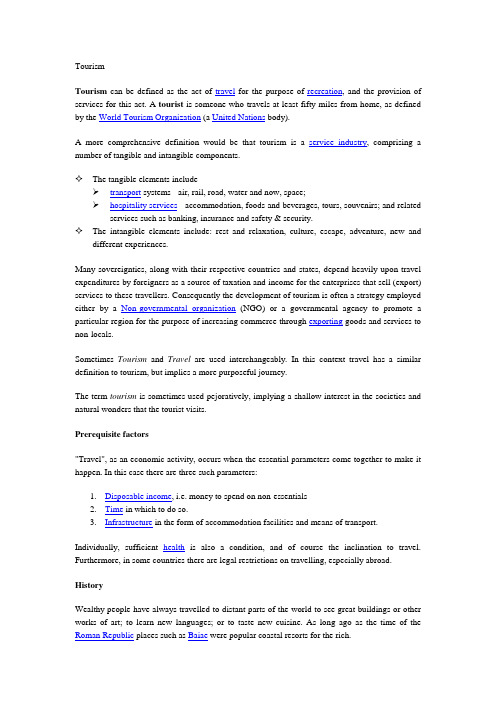
TourismTourism can be defined as the act of travel for the purpose of recreation, and the provision of services for this act. A tourist is someone who travels at least fifty miles from home, as defined by the World Tourism Organization (a United Nations body).A more comprehensive definition would be that tourism is a service industry, comprising a number of tangible and intangible components.✧The tangible elements include➢transport systems - air, rail, road, water and now, space;➢hospitality services - accommodation, foods and beverages, tours, souvenirs; and related services such as banking, insurance and safety & security.✧The intangible elements include: rest and relaxation, culture, escape, adventure, new anddifferent experiences.Many sovereignties, along with their respective countries and states, depend heavily upon travel expenditures by foreigners as a source of taxation and income for the enterprises that sell (export) services to these travellers. Consequently the development of tourism is often a strategy employed either by a Non-governmental organization(NGO) or a governmental agency to promote a particular region for the purpose of increasing commerce through exporting goods and services to non-locals.Sometimes Tourism and Travel are used interchangeably. In this context travel has a similar definition to tourism, but implies a more purposeful journey.The term tourism is sometimes used pejoratively, implying a shallow interest in the societies and natural wonders that the tourist visits.Prerequisite factors"Travel", as an economic activity, occurs when the essential parameters come together to make it happen. In this case there are three such parameters:1.Disposable income, i.e. money to spend on non-essentials2.Time in which to do so.3.Infrastructure in the form of accommodation facilities and means of transport.Individually, sufficient health is also a condition, and of course the inclination to travel. Furthermore, in some countries there are legal restrictions on travelling, especially abroad.HistoryWealthy people have always travelled to distant parts of the world to see great buildings or other works of art; to learn new languages; or to taste new cuisine. As long ago as the time of the Roman Republic places such as Baiae were popular coastal resorts for the rich.The terms tourist and tourism were first used as official terms in 1937 by the League of Nations. Tourism was defined as people travelling abroad for periods of over 24 hours.The Grand TourThe word tour gained acceptance in the 18th century, when the Grand Tour of Europe became part of the upbringing of the educated and wealthy British nobleman or cultured gentleman. Grand tours were taken in particular by young people to "complete" their education. They travelled all over Europe, but notably to places of cultural and aesthetic interest, such as Rome, Tuscany and the Alps.The British aristocracy were particularly keen on the Grand Tour, using the occasion to gather art treasures from Europe to add to their collections. The volume of art treasures being moved to Britain in this way was unequalled anywhere else in Europe, and explains the richness of many private and public collections in Britain today. Yet tourism in those days, aimed essentially at the very top of the social ladder and at the well educated, was fundamentally a cultural activity. These first tourists, though undertaking their Grand Tour, were more travellers than tourists.Most major British artists of the eighteenth century did the "Grand Tour", as did their great European contemporaries such as Claude Lorrain. Classical architecture, literature and art have always drawn visitors to Rome, Naples, Florence.The Romantic movement (inspired throughout Europe by the English poets William Blake and Lord Byron, among others), extended this to Gothic countryside, the Alps, fast flowing rivers, mountain gorges, etc.Health tourism & leisure travelIt was not until the 19th century that cultural tourism developed into leisure and health tourism. Some English travellers, after visiting the warm lands of the South of Europe, decided to stay there either for the cold season or for the rest of their lives. Others began to visit places with health-giving mineral waters, in order to relieve a whole variety of diseases from gout to liver disorders and bronchitis.Leisure Travel was a British invention due to sociological factors. Britain was the first European country to industrialize, and the industrial society was the first society to offer time for leisure to a growing number of people. Not initially the working masses, but the owners of the machinery of production, the economic oligarchy, the factory owners, the traders, the new middle class.The British origin of this new industry is reflected in many place names. At Nice, one of the first and most well established holiday resorts on the French Riviera, the long esplanade along the sea front is known to this day as the Promenade des Anglais; and in many other historic resorts in continental Europe, old well-established palace hotels have names like the Hotel Bristol, Hotel Carlton or Hotel Majestic - reflecting the dominance of English customers to whom these resorts catered in the early years.Winter tourismEven winter sports were largely invented by the British leisured classes initially at the Swiss village of Zermatt (Valais) (year?) and St Moritz in 1864.Until the first tourists appeared, the Swiss thought of the long snowy winter as being a time when the best thing to do was to stay indoors and make cuckoo clocks or other small mechanical items.The first packaged winter sports holidays (vacations) followed in 1903, to Adelboden, also in Switzerland.Organized sport was well established in Britain before it reached other countries. The vocabulary of sport bears witness to this: rugby, football, and boxing all originated in Britain, and even Tennis, originally a French sport, was formalized and codified by the British, who hosted the first national championship in the nineteenth century, at Wimbledon. Winter sports were a natural answer for a leisured class looking for amusement during the coldest season.Mass travelMass travel could not really begin to develop until two things occurred.a) improvements in technology allowed the transport of large numbers of people in a shortspace of time to places of leisure interest, andb) greater numbers of people began to enjoy the benefits of leisure time. A major developmentwas the invention of the railways, which brought many of Britain's seaside towns within easy distance of Britain's urban centres.The father of modern mass tourism was Thomas Cook who, on 5 July1841, organized the first package tour in history, by chartering a train to take a group of temperance campaigners from Leicester to a rally in Loughborough, some twenty miles away. Cook immediately saw the potential for business development in the sector, and became the world's first tour operator.He was soon followed by others, with the result that the tourist industry developed rapidly in early Victorian Britain. Initially it was supported by the growing middle classes, who had time off from their work, and who could afford the luxury of travel and possibly even staying for periods of time in boarding houses.However, the Bank Holiday Act 1871 introduced a statutory right for workers to take holidays, even if they were not paid at the time. (As an aside, in the UK there is still no obligation to pay staff who do not work on public holidays.)The combination of short holiday periods, travel facilities and distances meant that the first holiday resorts to develop in Britain were towns on the seaside, situated as close as possible to the growing industrial conurbations.For those in the industrial north, there were Blackpool in Lancashire, and Scarborough in Yorkshire. For those in the Midlands, there were Weston-super-Mare in Somerset and Skegness in Lincolnshire, for those in London there were Southend-on-Sea, Broadstairs, Brighton, Eastbourne, and a whole collection of other places.In travelling to the coast, the population was following in the steps of Royalty. King George III is widely acknowledged as popularising the seaside holiday, due to his regular visits to Weymouth when in poor health.For a century, domestic tourism was the norm, with foreign travel being reserved, as before, for the rich or the culturally curious. A minority of resorts, such as Bath, Harrogate and Matlock, emerged inland. After World War II holiday villages such as Butlins and Pontins emerged, but their popularity waned with the rise of package tours and the increasing comforts to which visitors became accustomed at home. Towards the end of the 20th century the market was revived by the upmarket inland resorts of Dutch company Centre Parcs.Other phenomena that helped develop the travel industry were paid holidays:• 1.5 million manual workers in Britain had paid holidays by 1925•11 million by 1939 (30% of the population in families with paid holidays)Outside BritainSimilar processes occurred in other countries, though at a slower rate, given that nineteenth century Britain was far ahead of any other nation in the world in the process of industrialisation.In the USA, the first great seaside resort, in the European style, was Atlantic City, New Jersey.In Continental Europe, early resorts included Ostend(for the people of Brussels), and Boulogne-sur-Mer (Pas-de-Calais) and Deauville (Calvados) (for Parisians).International mass tourismIncreasing speed on railways meant that the tourist industry could develop internationally. By 1901, the number of people crossing the English Channel from England to France or Belgium had passed 0.5 million per year.However it was with cheap air travel in combination with the package tour that international mass tourism developed after 1963. For the worker living in greater London, Brindisi today is almost as accessible as Brighton was 100 years ago.Recent developmentsThere have been a few temporary setbacks in tourism, the latest being related to the September 11, 2001 attacks and terrorist threats to tourist destinations such as Bali and European cities. Some of the tourist destinations, including the Costa del Sol, the Baleares and Cancun have lost popularitydue to shifting tastes and perceptions among tourists. In this context, the excessive building and environmental destruction often associated with traditional "sun and beach" tourism may contribute to a destination's saturation and subsequent decline. This appears to be the case with Spain's Costa Brava, a byword for this kind of tourism in the 1960s and 1970s. With only 11% of the Costa Brava now unblemished by low-quality development (Greenpeace Spain's figure), the destination now faces a crisis in its tourist industry. Belated attempts to move towards "quality tourism" are difficult given competition from cheaper, unspoilt holiday destinations on the one hand and the legacy of decades of over-exploitation on the other. In many respects, Tenerife provides a paradigm of the negative impact of mass tourism. Organizations like Greenpeace and ATAN () are particularly critical of development on the island, arguing that Tenerife's current tourism industry is both economically and environmentally unsustainable.Receptive tourism is now growing at a very rapid rate in many developing countries, where it is often the most important economic activity in local GDP.In recent years, second holidays or vacations have become more popular as people's disposable income increases. Typical combinations are a package to the typical mass tourist resort, with a winter skiing holiday or weekend break to a city or national park.On 26 December2004 a tsunami 2004 Indian Ocean earthquake hit Asian countries bordering the Indian Ocean, and also the Maldives. Tens of thousands of lives were lost, and many tourists died. This, together with the vast clean-up operation in place, has stopped or severely hampered tourism to the area.Special forms of tourismFor the past few decades other forms of tourism, also known as niche tourism, have been becoming more popular, particularly:•Adventure tourism: Tourism involving travel in rugged regions, or adventurous sports such as mountaineering and hiking (tramping).•Agritourism: Farm based tourism, helping to support the local agricultural economy.•Armchair tourism and virtual tourism: not travelling physically, but exploring the world through internet, books, TV, etc.•Cultural tourism: Includes urban tourism, visiting historical or interesting cities, such as London, Paris, Prague, Rome, Cairo, Beijing, Kyoto, and experiencing their cultural heritages. May also consist of specialized cultural experiences, such as art museum tourism where one visits many art museums during the tour, or opera tourism where one sees many operas or concerts during the tour.•Disaster tourism: travelling to a disaster scene not primarily for helping, but because one finds it interesting to see. It can be a problem if it hinders rescue, relief and repair work.•Drug tourism (for use in that country, or, legally often extremely risky, for taking home) •Ecotourism: Sustainable tourism which has minimal impact on the environment, such as safaris (Kenya) and Rainforests (Belize), or national parks.•Educational tourism: May involve travelling to an education institution, a wooded retreat or some other destination in order to take personal-interest classes, such as cooking classes with a famous chef or crafts classes.•Gambling tourism, e.g. to Atlantic City, Las Vegas, Macau or Monte Carlo for the purpose of gambling at the casinos there.•Gay tourism: Tourism marketed to gays who wish to travel to gay-friendly destinations which feature a gay infrastructure (bars, businesses, restaurants, hotels, nightlife, etc.), the opportunity to socialize with other gays, and the feeling that one can relax safely among other gay people.•Heritage tourism: Visiting historical or industrial sites, such as old canals, railways, battlegrounds, etc.•Health tourism: Usually to escape from cities or relieve stress, perhaps for some 'fun in the sun', etc. Often to "health spas".•Hobby tourism: Tourism alone or with groups to participate in hobby interests, to meet others with similar interests, or to experience something pertinent to the hobby. Examples might be garden tours, or square dance cruises.•Medical tourism, e.g.:o for what is illegal in one's own country, e.g. abortion, euthanasia; for instance, euthanasia for non-citizens is provided by Dignitas in Switzerland.o for advanced care that is not available in one's own countryo in the case that there are long waiting lists in one's own countryo for use of free or cheap health care organisations•Perpetual tourism: Wealthy individuals always on holiday, some of them, for tax purposes, to avoid being resident in any country.•Regional tourism Tourism bundle of few country in the region, using one of the country as the transit point. The country of transit point is usually a country with good transport infrastructure. e.g. Singapore is the base for tourism for South East Asia due to its strategic location and good transport infrastructure.•Sex tourism: mostly men from First World countries visiting Third World countries for purpose of engaging in sexual acts, usually with inexpensive local prostitutes. This form of tourism is often cited the principal way that paedophiles can hire child prostitutes.•Sport tourism: Skiing, golf and scuba diving are popular ways to spend a vacation. Also in this category is vacationing at the winter home of one's favorite baseball team, and seeing them play everyday.•Space tourismTrendsThe World Tourism Organization forecasts that international tourism will continue growing at the average annual rate of 4 percent. By 2020 Europe will remain the most popular destination, but its share will drop from 60 percent in 1995 to 46 percent. Long-haul will grow slightly faster than intraregional travel and by 2020 its share will increase from 18 percent in 1995 to 24 percent.✧Space tourism is expected to "take off" in the first quarter of the 21st century, althoughcompared with traditional destinations the number of tourists in orbit will remain low until technlogies such as space elevator make space travel cheap.✧Technological improvement is likely to make possible air-ship hotels, based either onsolar-powered airplanes or large dirigibles. Underwater hotels, such as Hydropolis, slated to open in Dubai in 2006, will be built. On the surface of the ocean tourists will be welcomed by ever larger cruise ships and perhaps floating cities.✧Some futurists expect that movable hotel "pods" will be created that could be temporarilyerected anywhere on the planet, where building a permanent resort would be unacceptable politically, economically or environmentally.See also•Backpacking•Hospitality Services•Hotel•Passport•Pilgrimage•Tourism in literature•Transport•World Tourism Organization•World Tourism Rankings•List of popular tourist regions•List of types of lodging•List of international travel guides and web sites。
旅游管理就业方向作文英语
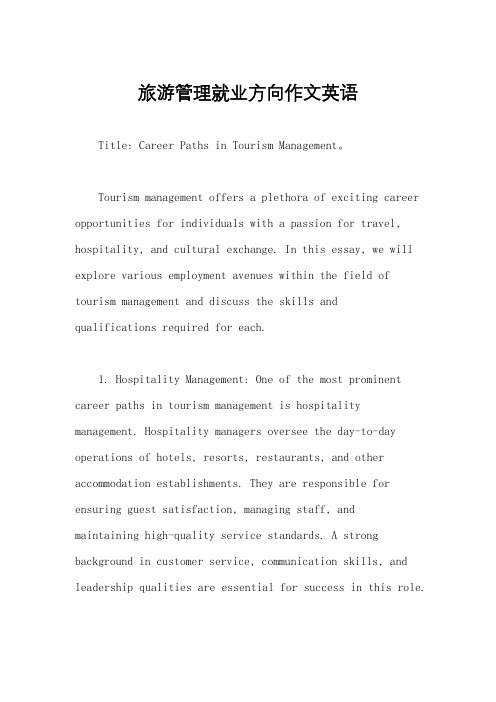
旅游管理就业方向作文英语Title: Career Paths in Tourism Management。
Tourism management offers a plethora of exciting career opportunities for individuals with a passion for travel, hospitality, and cultural exchange. In this essay, we will explore various employment avenues within the field of tourism management and discuss the skills andqualifications required for each.1. Hospitality Management: One of the most prominent career paths in tourism management is hospitality management. Hospitality managers oversee the day-to-day operations of hotels, resorts, restaurants, and other accommodation establishments. They are responsible for ensuring guest satisfaction, managing staff, andmaintaining high-quality service standards. A strong background in customer service, communication skills, and leadership qualities are essential for success in this role.2. Event Planning: Event planning is another exciting career option within the tourism industry. Event planners coordinate and execute various events such as conferences, weddings, festivals, and corporate gatherings. They work closely with clients to understand their needs and preferences, manage budgets, liaise with vendors, and ensure the smooth execution of events. Attention to detail, organizational skills, and creativity are crucial for thriving in this fast-paced environment.3. Tour Operations: Tour operators design and organize travel packages for individuals and groups. They research destinations, arrange transportation and accommodation, create itineraries, and provide assistance to travelers throughout their journey. Tour operators must possess excellent geographical knowledge, negotiation skills, and a knack for customer service to deliver memorable travel experiences.4. Destination Management: Destination management involves promoting and managing tourist destinations to attract visitors and boost local economies. Destinationmanagers work closely with government agencies, tourism boards, and local businesses to develop marketing strategies, infrastructure improvements, and sustainable tourism practices. Strong analytical skills, strategic thinking, and a passion for community development are essential for this role.5. Travel Agency Management: Travel agencies play avital role in assisting travelers with booking flights, accommodations, tours, and other travel-related services. Travel agency managers oversee staff, maintain business relationships with suppliers, and implement sales and marketing strategies to attract clients. A background in sales, marketing, and business management is beneficial for aspiring travel agency managers.6. Cruise Line Management: Cruise line management involves overseeing the operations of cruise ships and ensuring the comfort and satisfaction of passengers. Cruise line managers supervise onboard staff, manage finances, and implement safety protocols to maintain a pleasant andsecure environment for passengers. Strong leadership skills,industry knowledge, and crisis management abilities are crucial in this dynamic sector.7. Ecotourism and Sustainable Tourism: With increasing awareness of environmental issues, there is a growing demand for professionals specializing in ecotourism and sustainable tourism practices. Ecotourism managers develop and promote environmentally friendly travel experiencesthat support conservation efforts and benefit local communities. A passion for environmental conservation, cultural preservation, and stakeholder engagement are key attributes for success in this field.In conclusion, the field of tourism management offers a diverse range of career opportunities suited to individuals with various interests and skill sets. Whether you're drawn to hospitality, event planning, destination management, or sustainable tourism, there are ample prospects for professional growth and personal fulfillment within this dynamic industry. By acquiring relevant skills, gaining practical experience, and staying abreast of industry trends, aspiring tourism professionals can embark onrewarding career journeys that allow them to explore the world while making a positive impact on the lives of others.。
旅行社的英文单词
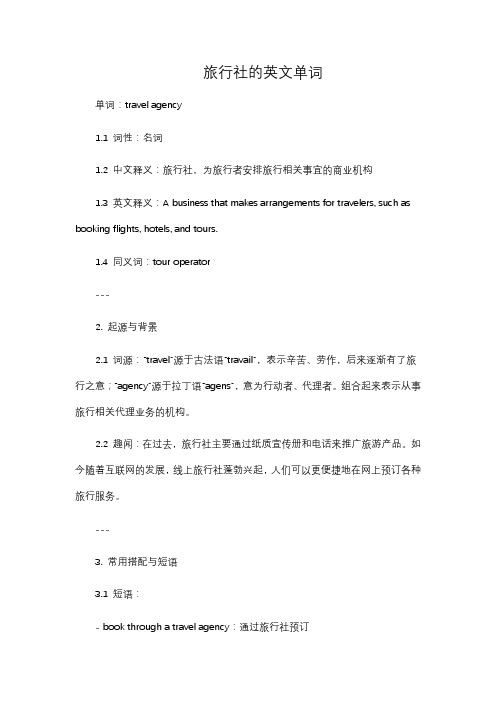
旅行社的英文单词单词:travel agency1.1 词性:名词1.2 中文释义:旅行社,为旅行者安排旅行相关事宜的商业机构1.3 英文释义:A business that makes arrangements for travelers, such as booking flights, hotels, and tours.1.4 同义词:tour operator---2. 起源与背景2.1 词源:“travel”源于古法语“travail”,表示辛苦、劳作,后来逐渐有了旅行之意;“agency”源于拉丁语“agens”,意为行动者、代理者。
组合起来表示从事旅行相关代理业务的机构。
2.2 趣闻:在过去,旅行社主要通过纸质宣传册和电话来推广旅游产品。
如今随着互联网的发展,线上旅行社蓬勃兴起,人们可以更便捷地在网上预订各种旅行服务。
---3. 常用搭配与短语3.1 短语:- book through a travel agency:通过旅行社预订例句:We decided to book our honeymoon trip through a travel agency.翻译:我们决定通过旅行社预订我们的蜜月之旅。
- travel agency brochure:旅行社宣传册例句:The travel agency brochure introduced many exotic destinations.翻译:旅行社宣传册介绍了许多充满异国情调的目的地。
- local travel agency:当地旅行社例句:The local travel agency offers some special tours around the city.翻译:当地旅行社提供一些城市周边的特色旅游线路。
---4. 实用片段(1). “I'm planning a trip to Europe. Should I go to a travel agency or book everything online by myself?” asked Tom. His friend replied, “Well, a travel agency might be able to give you some professional advice and take care of all the details for you.”翻译:“我正在计划去欧洲旅行。
旅行社经营与管理导论精讲

第一章 旅行社概述
目的要求
通过本章的学习使学生掌握旅行社的定义, 熟悉旅行社的产生与发展、旅行社的性质 与职能、旅行社的业务范围与基本业务、 创立旅行社密切相关的设立程序、旅行社 的组建方式与组织设计等内容,了解旅行 社的分工体系与分类制度、旅游行业组织 的功能与职责。
4
第一节 旅行社的产生与发展
46
三、中国旅行社行业组织 中国旅行社协会
(CATS:China Association of Travel Services)
47
[思考题]
1、中外旅行社产生的背景有何不同?结合我 国现阶段的社会经济发展条件思考旅行社发 展所面临的问题?
2、旅行社的性质与职能、业务范围的关系?
3、旅行社分类制度的发展趋势思考?
2、发展 初步形成阶段(1978-1989) 快速增长阶段(1990~1994) 结构调整阶段(1995~2001) 全面开放阶段(2002~)
19
第二节 旅行社的性质、职能和基 本业务
一、旅行社的性质 性质的理解是以其对业务的把
握为前提。 旅行社是旅游产品的供应者与
消费者之间的中介组织。 服务性、盈利性、中介性。
24
根据《旅行社条例》(2009年5月1日 起实施)的规定:
旅行社是指从事招徕、组织、接 待旅游者等活动,为旅游者提供相 关旅游服务 ,开展国内旅游业务、 入境旅游业务或者出境旅游业务的 企业法人。
25
而在《旅行社条例实施细则》(2009年5月3日起实 施)规定:
所称招徕、组织、接待旅游者提供的 相关服务主要包括:安排交通服务;安排 住宿服务;安排餐饮服务;安排观光游览、 休闲度假等服务;导游、领队服务;旅游 咨询、旅游活动设计服务。
Travel Agent 旅行社英语ppt课件

Benefits – why a particular feature is good for the customer you are talking to at that moment.
19
LOGO
At this point in the process many customers will want time to think. The best thing to do is to get their contact details and invite them to take the brochures home and browse through them. If you have done a good job of presenting the product, they will probably be back a few days later.
For the package tour, we will pay for the round-trip tickets and all the meals during the tour.
Hotel accommodation is also included in the price I gave you. You will stay in a three-star hotel.
It will cover all the fees of the trip. Children under 1.2 m in height travel free,
except for their meals.
23
LOGO
On the first, the tour will visit…on the second day, they will tour… on the last day, they will visit…
中山大学旅游管理课程介绍(双语班)
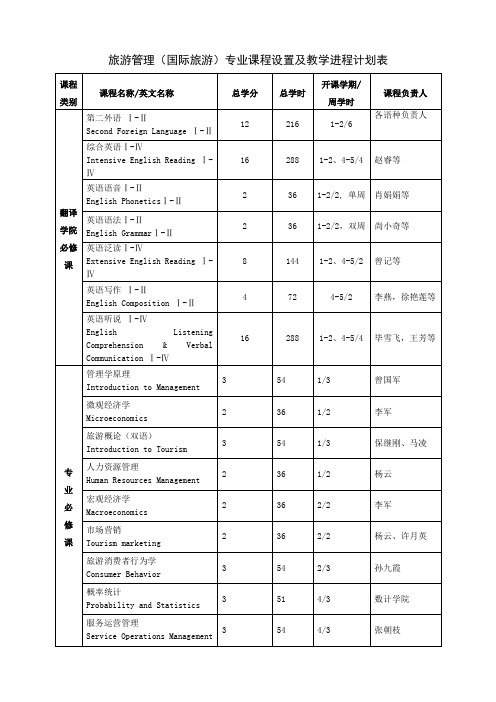
54
7/3
饶勇
酒店成本会计
Hotel Cost Accounting
3
54
8/3
外聘
酒店收益管理
Hotel Revenue Management
3
54
8/3
外聘
酒店督导管理
Supervision in the Hospitality Industry
2
36
8/2
饶勇
休
闲
与
俱
乐
部
管
理
选
修
课
休闲与体育旅游
2
36
10/2
戴耀宗
旅
游
规
划
与
管
理
选
修
课
旅游规划与公共政策
Tourism Planning and Public Policy
3
54
7/3
徐红罡
景区经营管理
Tourist Destination Managemen
旅游电子商务
Tourism E-Commerce
3
54
8/3
吴浩存
社区旅游规划与管理
Community-Based Tourism Planning and Management
3
54
8/3
孙九霞
旅游目的地营销
Tourism Destination Marketing
3
54
8/3
外聘
景观设计
Landscape Design
3
54
8/3
林敏慧
服务实习
Practice
英语写作 Ⅰ-Ⅱ
English Composition Ⅰ-Ⅱ
如何经营旅行社作文英语
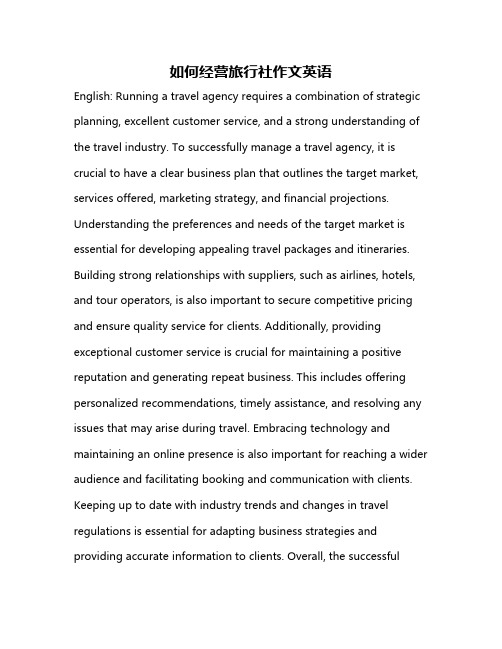
如何经营旅行社作文英语English: Running a travel agency requires a combination of strategic planning, excellent customer service, and a strong understanding of the travel industry. To successfully manage a travel agency, it is crucial to have a clear business plan that outlines the target market, services offered, marketing strategy, and financial projections. Understanding the preferences and needs of the target market is essential for developing appealing travel packages and itineraries. Building strong relationships with suppliers, such as airlines, hotels, and tour operators, is also important to secure competitive pricing and ensure quality service for clients. Additionally, providing exceptional customer service is crucial for maintaining a positive reputation and generating repeat business. This includes offering personalized recommendations, timely assistance, and resolving any issues that may arise during travel. Embracing technology and maintaining an online presence is also important for reaching a wider audience and facilitating booking and communication with clients. Keeping up to date with industry trends and changes in travel regulations is essential for adapting business strategies and providing accurate information to clients. Overall, the successfuloperation of a travel agency requires attention to detail, flexibility, and a dedication to providing unforgettable travel experiences for clients.中文翻译: 经营旅行社需要综合运筹,优质客户服务以及对旅行业的深刻理解。
- 1、下载文档前请自行甄别文档内容的完整性,平台不提供额外的编辑、内容补充、找答案等附加服务。
- 2、"仅部分预览"的文档,不可在线预览部分如存在完整性等问题,可反馈申请退款(可完整预览的文档不适用该条件!)。
- 3、如文档侵犯您的权益,请联系客服反馈,我们会尽快为您处理(人工客服工作时间:9:00-18:30)。
Travel Agency Management
Managers of successful agencies must carefully watch all areas of the company’s operations to generate a profit.
This requires keeping overhead costs to a minimum, maintaining high productivity per employee, producing high-volume bookings, and maintaining higher average profit margins on the bookings.
Liabilities of Travel Agency
In general, a travel agency can avoid liability problems by performing precisely the servh the client.
It is important for them to review carefully all of the advertising and promotional materials they give to clients to make certain the wording in such material does not negate their disclaimers.
Four areas of special significance to travel agencies in terms of maximizing profits:
1)Making Effective Use of Assistance by Suppliers .
2) Selling Other Travel Services . 3) Managing the Compensation Mix . 4) Automation .
travel agents and suppliers in order to avoid the danger of being sued by a client for problems created by an intermediary through insurance and use of disclaimers.
A travel agency, for example, may receive a higher percentage commission from a cruise line than from a domestic airline.
Retail travel agents may also obtain override commissions from wholesalers and other suppliers such as airlines and hotels.
Travel Agency and Suppliers
Travel agent is one of the most important members of the travel industry.
It is the person who brings together the suppliers of travel services with the buyers and offers them something.
Suppliers also offer other forms of incentives to travel agents to entice them to sell their services.
Travel agencies are not high-profit businesses. Many small agencies, where the owner and the operator are the same person, may operate on only a slight profit or none at all.
Travel agent usually does not own the services he or she sells to travelers. The agent is paid a commission by suppliers for sales of airline tickets, hotel rooms, and so on.
commission vt. To place an order for.
A retail travel agent is a commissioned intermediary who serves as a sales outlet for : carriers, hotels and resorts, entertainment centers, car rental companies, other suppliers, including wholesalers.
Lesson Ten Travel Agency Management
Travel Agency and Suppliers Liabilities of Travel Agency Conferences and Associations Commissions and Overrides Travel Agency Management Future Trends
Future Trends
In summary, the travel agency business, which was once thought of as being a relatively simple one to enter, is becoming increasingly complicated .
One possible sales mix looks like this:
The American Society of Travel Agents (ASTA),
The Association of Retail Travel Agents (ARTA).
Commissions and Overrides
Travel agents receive commissions from suppliers and wholesalers.
The independent travel agency with no affiliation is fading away, replaced by megaagencies and franchise agreements.It can survive by joining a cooperative marketing service or a consortium of agencies that is necessary to negotiate the override enjoyed by the franchised and mega-agency.
Wholesalers commonly offer a graduated rate schedule for overrides. This means that the percentage override offered to a travel agent increases as the number of bookings produced by the agent increases.
It can be held responsible for and cannot be held responsible for a client .
Though an agent cannot be responsible for social conditions crime or riots, for instance the agent does have a responsibility to inform the client about known adverse factors of the destinations .
Conferences and Associations
three major conferences: The Airline Reporting Corporation (ARC),
which replaced The Air Traffic Conference (ATC) due to deregulation; The International Airline Travel Agency Network (IATAN), composed of U.S. and foreign airlines with international routes; and The Cruise Lines International Association (CLIA), composed of major cruise lines operating throughout the world.
The two most influential conferences regarding the manner in which a travel agency does business are ARC and IATAN .
Competition in the travel agency business thus is very intense and may be expected to increase in the future. Although more agencies exist today, the number of bankruptcies has also reached record highs in recent years.
